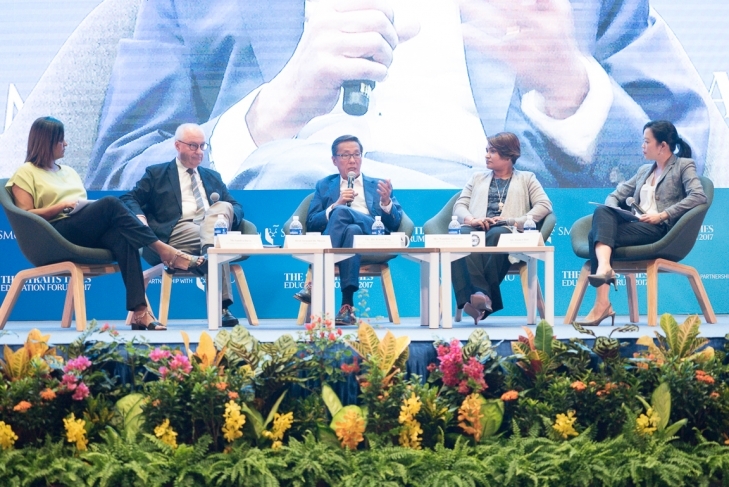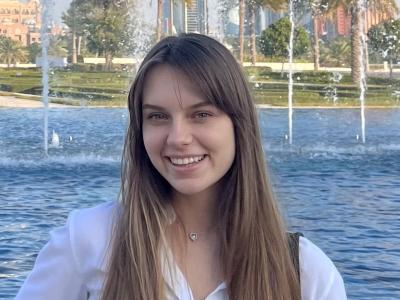
“Universities, as thought leaders, should have the courage, indeed the audacity, not so much to predict what jobs might disappear, but by drawing upon the lessons of the past to see into the future, to speculate what new jobs might emerge. Furthermore, we need to walk the talk by training students in fields of study which can dovetail with jobs which still do not exist today. That is the challenge we embrace at Singapore Management University.”

Mr Ho delivering the keynote address.
Mr Ho Kwon Ping, Chairman of SMU Board of Trustees, made this bold statement in his keynote address at the Straits Times (ST) Education Forum 2017. The forum was held in partnership with SMU as the first major event to be held at the new School of Law building on 25 March 2017.
The other panellists at the forum were Professor Arnoud De Meyer, President of SMU; Sandra Davie, ST Senior Education Correspondent; Ms Nandini Jayaram, the South-east Asia Human Resource Lead for Google Asia-Pacific; and the moderator, ST Managing Editor Fiona Chan.
Focussing on the future of work, universities and the economy, it attracted about 500 educators and students, mostly from junior colleges, polytechnics, IB and international schools, as well as the students’ parents and many others with an interest in the topic. Students attending were invited to an inspiring workshop before the forum during which they learned how to choose their own career path and prepare to be “leaders of the future of work”.

Students and educators at the workshop held before the forum.
New opportunities
In a lively dialogue during the main forum, Professor De Meyer said that the rise of technology and automation has created fears about job losses in the future economy. He argued, however, that technology has also created new opportunities, and even traditional degrees like those in literature and languages can still retain their relevance. Citing an example of how people who have studied languages and writing might be needed by video game companies to craft storylines, Professor De Meyer said "there are (many) interesting jobs that are being created" because of technology. He advised young people against worrying excessively about which jobs would be rendered obsolete, urging them to "follow your passion in what you want to study".

Prof De Meyer: “Follow your passion in what you want to study”.
Ms Chan asked how universities can distinguish themselves given that their brands would increasingly become less relevant as more begin to prize an individual's skills over credentials. Prof De Meyer said universities would have to transform how they are structured, paying more attention to inter-disciplinary programmes and creating an environment where students can "learn how to learn".
Ms Davie cited the Stanford 2025 project, which has been exploring ideas around how the university's undergraduate experience could be re-imagined. One suggestion is that students might not choose a major but state their missions or purposes instead. The university would then design courses and programmes to help them achieve these missions. "I think it's a powerful way to look at university education. It's about preparing you for work and life," said Ms Davie.
Asked if choosing inter-disciplinary programmes would improve one's prospects of securing a job, Ms Jayaram said such a hypothesis that starts off with the intention of securing a job is misplaced.
Instead, she said, jobs of the future will depend on the problems that society needs to solve - ride-hailing app Grab, for example, started with the intent of addressing inefficiencies in transport. It may be more vital to develop critical problem-solving skills. Ms Jayaram said: "The types of jobs (that will be) available 20 years from now are going to be unpredictable to some degree. If you don't think about the skills you need, or the interests you have... and work backwards, in some ways you are limiting yourself."
Opening the debate to the floor, members of the audience posed questions to the panel about whether Singapore is producing too many university graduates; what are the ‘deep skills’ which the government is encouraging Singaporeans to acquire; the importance of corporate socialisation; how can companies cope with disruption; the qualities that universities look for when selecting students for admission; how to choose a degree; and the role of the humanities in education.

A member of the audience of 500 students, educators and other members of the public raising a question during the open dialogue with the panel.
|
Praise from participants “I came last year and found it fascinating, so I was keen to come again,” said Ms Tan Wan Yu, Principal at Millennia Institute. “What was most interesting was the message that it is up to today’s students to create the kind of jobs that they want,” she added. “I just wish that the event could be even bigger so that I could bring more students!” Dunman High School student Soo Sze Jie said she was given a deeper insight on how it impacts different sectors. Jobs not heavily reliant on skills such as social perceptiveness and originality, like accountancy, have a higher chance of becoming automated. But those demanding people skills, like teaching, are not as threatened. "It was helpful to see that being broken down into the specific categories," she said. Ms Jean Oh, who attended with her daughter Chantel Yang, a student at Hua Chong Institution, said the forum was very useful. “It was interesting to learn more about the universities and jobs out there,” she said. Youth leader David Hoe said he found the speakers' backgrounds interesting, as ST correspondent Sandra Davie was previously a teacher, while SMU board of trustees chairman Ho Kwon Ping was a journalist before founding hospitality group Banyan Tree Holdings. David said, "Their backgrounds show how we don't have to pigeonhole jobs for the future." “I thought Mr Ho was a very good speaker” said Wang Mengzhe, who is studying on a scholarship at Victoria Junior College, “He made very valid and relevant points.” Temasek Junior College student Anri Takemoto said the forum had made her aware of how many jobs were becoming automated. However, as a student in the arts stream she was encouraged that greater value was now being placed on studying the humanities and developing creativity. Participants mingled and networked during the breakfast and lunch provided before and after the workshop and forum. |
|||||||||||||||||||||||||||||||||||||||||||||||||||||||||||||||||||||||||||||||||||||||||||||||||||||||||||||||||||||||||||||||||||||||||||||
Challenges in education
Ms Chan asked the panel how universities should be structured to support lifelong learning. Mr Ho acknowledged that addressing the "more fundamental problem" would introduce "disruptive change" in the system.
Mr Ho said Singapore's higher education system, by requiring students to decide on a major when they apply to university, contradicts its own philosophy of getting Singaporeans to see education as a lifelong exercise. "We talk a lot, even at undergraduate level, about how we shouldn't pigeonhole students when they are so young," said Mr Ho. But Singapore is not really "walking the talk about flexibility and lifelong learning" if it does not address this issue of forcing students to decide at too young an age, he said.
"We're forcing our youngsters to decide at an age when they are not ready to be an accountant, (for example). Now, at most, we're going to make you the most flexible, creative accountant in the world. But what if... (after) one year of accountancy, you actually want to do computer engineering? Or you want to go to business? We do not allow you to do so."
"But unless we go that way, I don't think we're going to really grapple with this problem, because we still have inbuilt inflexibility."
Forum panellists were also asked by Ms Chan about traits they would look out for if they were hiring someone to take over their own job.
Ms Jayaram spoke about "Googleyness", alongside other traits like leadership and problem-solving skills. "Do you challenge the status quo? Are you willing to ask the hard questions, call out the elephant in the room?
"It is easy to do the right thing when all conditions are ideal, but how do you make trade-offs? How do you optimise? And how do you navigate the grey zone... If things go wrong, how do you take ownership or accountability?"
Professor Meyer encouraged students at the forum to “Go overseas, get yourself into difficult situations, get out of this wonderful infrastructure... go to places where services don't work very well." He said having international experience can help one acquire characteristics that "you don't learn by writing an algorithm".
· Read excerpts from Mr Ho’s keynote address here.
· Watch SMU’s Facebook ‘live’ video here.
· See the ST’s coverage of the forum here.

Panel members and senior representatives from SMU and The Straits Times (ST) who made the forum possible. From left: Mr Marc Lim, ST News Editor; Prof Arnoud De Meyer, SMU President; Ms Nandini Jayaram, South-east Asia Human Resource Lead, Google Asia-Pacific; Mr Ho Kwon Ping, SMU Chairman; Ms Sandra Davie, ST Senior Education Correspondent; Ms Fiona Chan, ST Managing Editor; Prof Lily Kong, SMU Provost; Mr Warren Fernandez, Editor-in-Chief EMTMG, Editor The Straits Times.
Main photo: The forum panel (from left) Ms Sandra Davie, ST Senior Education Correspondent; Professor Arnoud De Meyer, President of SMU; Mr Ho Kwon Ping, Chairman of SMU Board of Trustees; Ms Nandini Jayaram, the South-east Asia Human Resource Lead, Google Asia-Pacific; and the moderator, Fiona Chan, ST Managing Editor.

